Anwar Ibrahim cancels his trip to Australia. (Photo: AFP)
My comments on Anwar Ibrahim cancelling an upcoming trip to Australia amidst a swirling sex video scandal have been included in an article by Amanda Hodge in The Weekend Australian.

Anwar Ibrahim cancels his trip to Australia. (Photo: AFP)
My comments on Anwar Ibrahim cancelling an upcoming trip to Australia amidst a swirling sex video scandal have been included in an article by Amanda Hodge in The Weekend Australian.

Haziq Aziz claims to be one of two men in a leaked video. The other man appears to be a senior figure in the People’s Justice Party. (Photo: Facebook)
I made some comments in an ABC article by Max Walden on the recent Malaysian sex video scandal.
“Malaysia has shown a rich tradition of such allegations being weaponised in politics, usually supported by visual props like images and videos.
They are usually aimed at widening divisions and causing splits, allowing competitors to gain the upper hand in political contests.
They tend to take on a moral tone, with the aim of discrediting the person being targeted.”
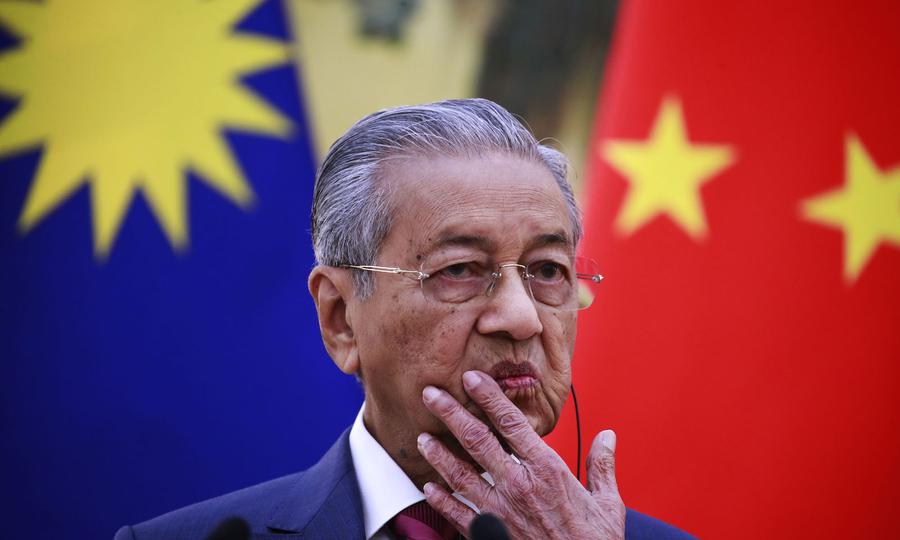
PM Mahathir Mohamad speaks at a press conference at the Great Hall of the People in Beijing, August 20, 2018 (Photo: AFP/How Hwee Young).
I was happy to add my to comments this excellent article by Nile Bowie in the Asia Times on the recommenced East Coast Rail Link (ECRL), a multibillion-dollar China-backed infrastructure project. This is an important political victory for Harapan, which has been working hard to convince Malaysians former PM Najib Razak’s Chinese projects were corrupt and overpriced. It also represents a step forward for the government in managing its relations with China.
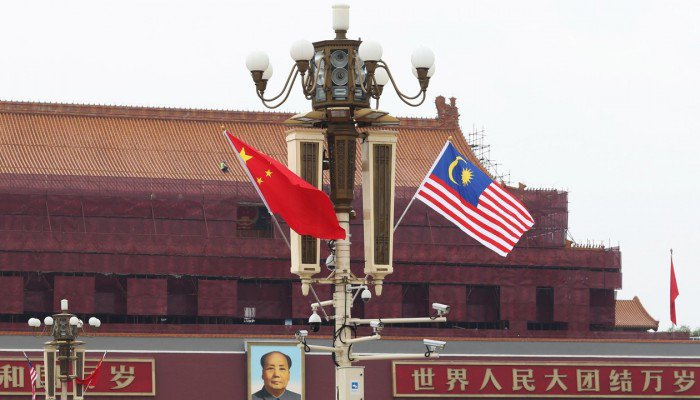
The Chinese and Malaysian flags fly at Tiananmen Square in Beijing (Photo: Reuters)
I’ve been quoted in this piece by in the South China Morning Post, sharing some of my thoughts on Mahathir’s China strategy and the tone of relations between the two Asian nations.
As I mentioned, since the election, Mahathir has been keen to explain that the anti-China election campaign was not actually directed at China, but rather at Najib.
“The idea of resetting the Malaysia-China relationship so it becomes about growth and opportunity – as opposed to debt and corruption which he has associated with Najib – is appealing to voters who feel they’ve been going under, because of the pressure exerted on them by corruption, inadequate social protections, and the cost of living.”
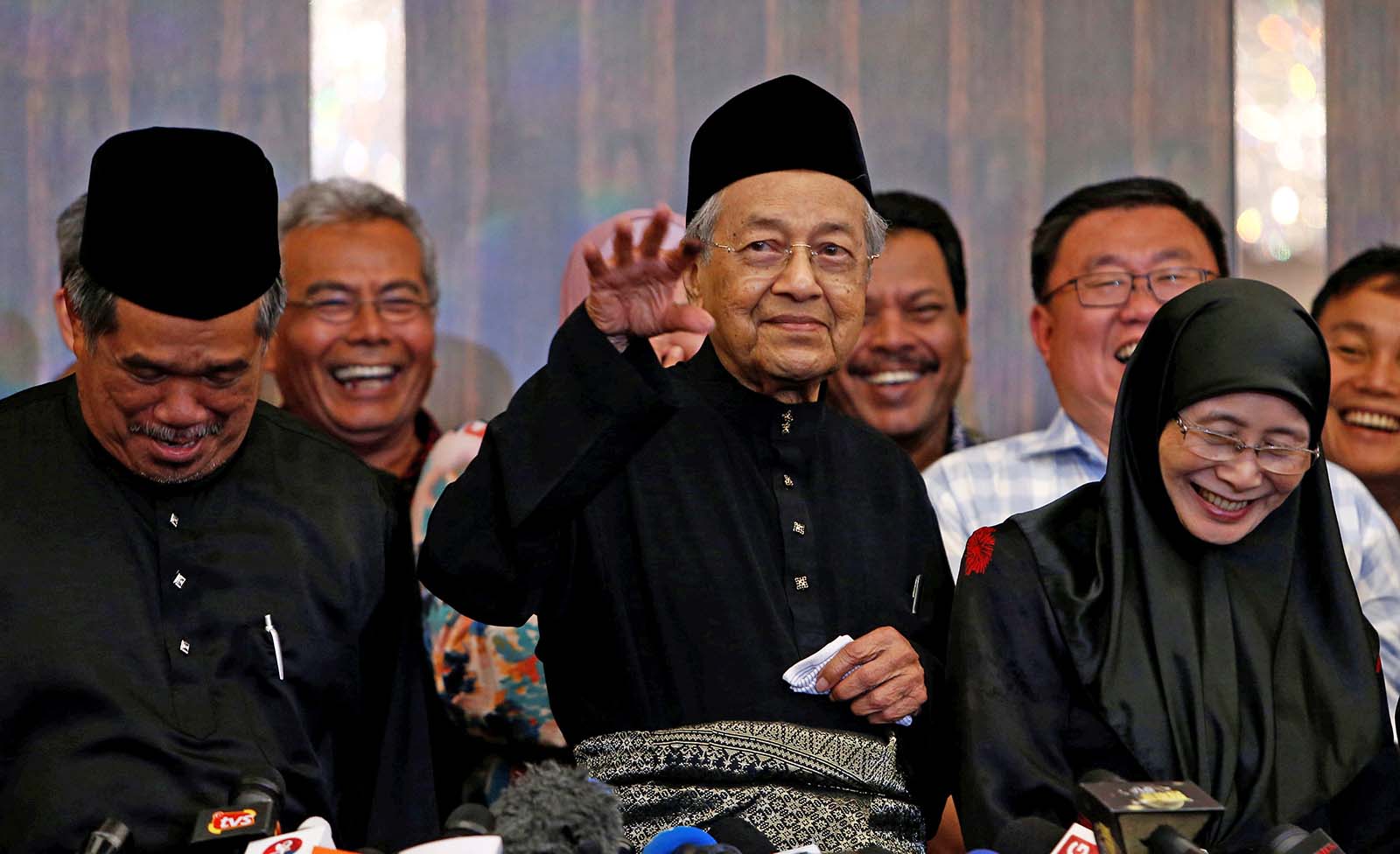
Malaysian Prime Minister Dr Mahathir at a press conference in Kuala Lumpur, May 10, 2018 (Photo: Reuters/Lai Seng Sin)
I’ve been quoted in this excellent article on Malaysia-China relations by Nile Bowie in the Asia Times, with whom I was very happy to share my some of my thoughts:
“Since the election, Mahathir and other government figures have been at pains to explain that the ‘anti-China’ election campaign was in fact directed at Najib, and not China.”
“China and Malaysia have invested in some heavy PR in recent months, promoting the strength and dynamism of their bilateral ties and mobilizing high-profile businessmen like Jack Ma to project the message that the two nations are closer than ever, and can reset their relationship to deliver wide bilateral benefits.”
“Mahathir has been speaking not only to China’s leaders but to his domestic constituency in Malaysia… (the Malaysian premier’s aim) is to demonstrate that he can return Malaysia to a policy of non-alignment and deliver a new era of prosperity, even in a climate shaped by heightened great power competition.”
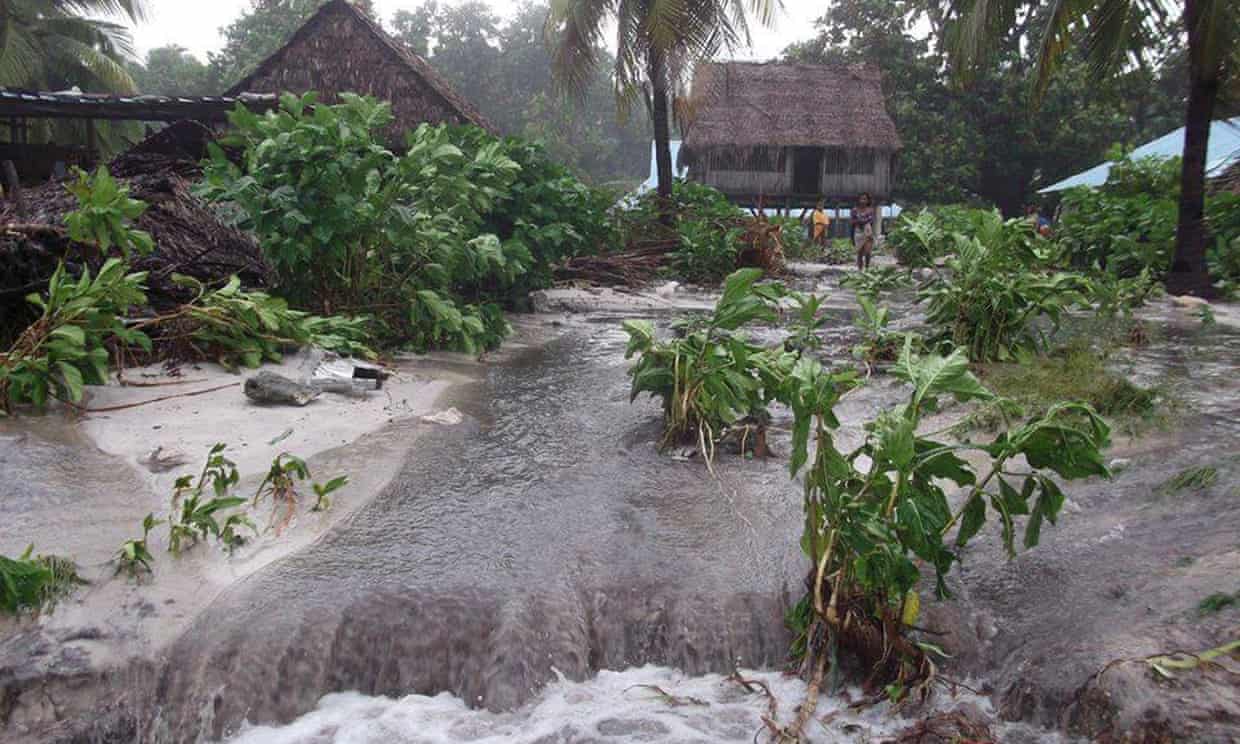
Cyclone Pam tearing through Kiribati in 2015 (Photo: Mike Roman/Red Cross Australia/EPA).
Another comment, this time for a piece by Paul Karp in The Guardian that covers a recently released internal government report which found that Australia’s climate action policies have been derailed since 2013. I pointed out that before then, DFAT’s climate action initiatives were starting to take off, but then climate objectives were “stripped out and investments closed down”. I also mentioned that:
“After five years, it is only now that there are early signs of recovery and climate change is being considered as a more important component of the aid program. Compared to our allies, like the UK, we are now playing catch-up.”

A white Himalaya Crocodile Hermès Birkin handbag, allegedly purchased by Datin Seri Rosmah Mansor for US$380,000 (RM1.5 million) (Photo: Christies)
My Twitter musings on the value of handbags have ended up included in an article by Zurairi AR in the Malay Mail, which dissects the meaning behind the expensive handbag collection of Datin Seri Rosmah Mansor, the wife of the former Prime Minister, Najib Razak. A massive collection of handbags, jewellery, cash, and other items was discovered during police raids on Najib’s home and those of his family members.
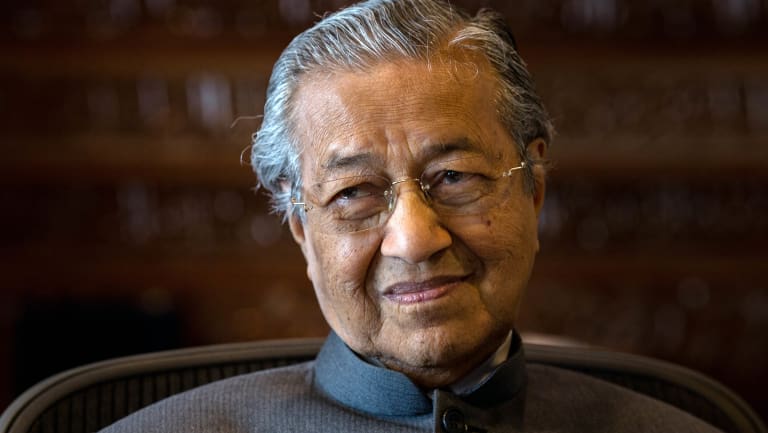
Mahathir Mohamad, Malaysia’s former prime minister and now opposition leader (Photo: Bloomberg).
Today I was quoted in an article by James Massola on the coming Malaysian general election, which I predict will be called before June 8 (Anwar Ibrahim’s release date from jail) so that Anwar and Mahathir are denied the chance to campaign together as the 1990s ‘dream team’.
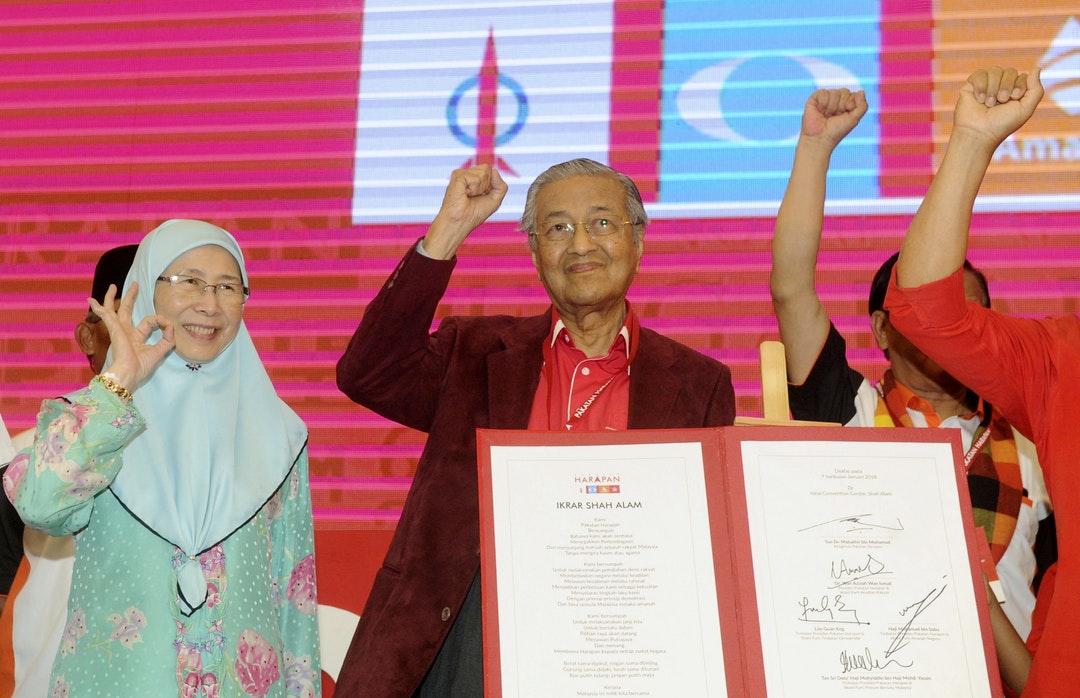
Dr Mahathir Mohamad and Wan Azizah, wife of former Deputy Prime Minister Anwar Ibrahim stand together during a political opposition alliance meeting in Shah Alam, Malaysia (Photo: AP/TPG).
Some of my comments have been included in The News Lens in an insightful article by Kean Wong. Wong discusses the coming Malaysian election, and the country’s quest for a new national narrative, as well as including some of my points from a recent public forum hosted by New Mandala and ANU’s Malaysia Institute titled GE14: the polls, the money, the stakes. The forum also featured Ibrahim Suffian of the polling and research company the Merdeka Center, Prof Edmund Terence Gomez of Universiti Malaya, and lawyer Fadiah Nadwa Fikri of youth group Malaysia Muda.
A short extract of my points from Wong’s article is below, and I encourage you to read the full, rather excellent piece here.
It’s this reimagining of narratives that lie at the heart of the campaigns of GE14, said Dr Amrita Malhi at the forum. It’s a process of building the trust that Ibrahim Suffian said his recent polling found to be lacking, in different ways for different communities across the peninsula. Dr Malhi said both BN and PH strategists are framing the GE14 contest as a race to secure the new middle-class legacy of the 1990s, when the majority Muslim-Malays emerged with its urban middle classes, when Malaysia was a byword across the ummah for a nation developed equitably.
”This time, I’d argue that again there’s an even greater level of nostalgia, and an even more explicit ramping up of the nostalgia level in producing a new narrative of where the nation is going to go,” Dr Malhi said. ”And this time, it’s moved forward…they’ve moved the glory days to the 1990s. And it’s exactly the time before the economic crisis. And I’ve heard this put to me very explicitly by opposition strategy people: to talk about 1993–1996 in particular, the glory days of the Mahathir–Anwar team, before the struggles from 1997 and the financial crisis in 1998 began, and before this polity began fracturing and going in every single direction from 2008. Now this, I hear being referred to in PKR circles for example as a superb time, Malaysia at its peak.
”As the campaign heats up, I think the line is going be: let’s go back to this period in terms of the good times, the ’easy inter-ethnic interactions.’ Notice the ’easy inter-ethnic interactions’ is moving forward by a decade each time. Doesn’t matter: sometime in the past it was easy. That’s the main point. But, with the proviso as well there has to be institutional reform to ensure that the original dream team can finish only their good work and now their bad work.”
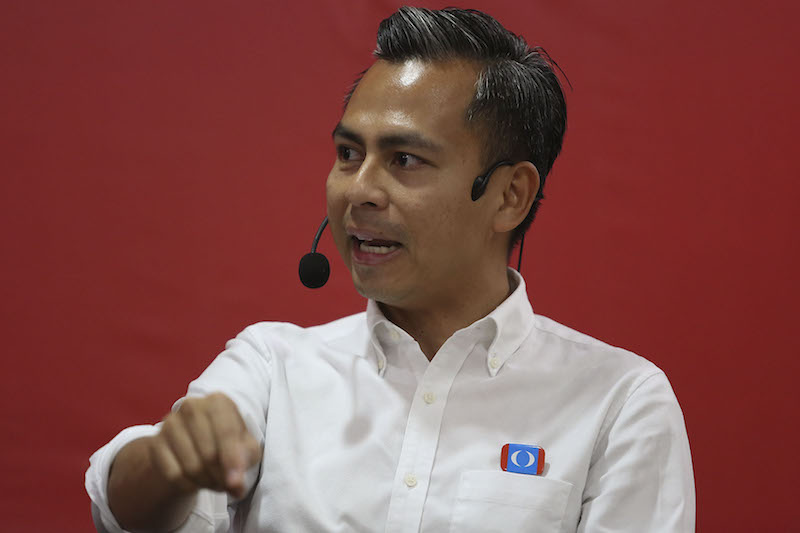
PKR communication chief Fahmi Fadzil said it makes sense that the people are not as vocal as they were 10 years ago because they are somewhat tired (Photo: Yusof Mat Isa).
I gave my opinion today in an excellent article by Anith Adilah and Emmanuel Santa Maria Chin in the Malay Mail Online around possible declining voter interest in politics in Malaysia. My view is that Malaysian voters are actually pretty interested in the election, but they’re either being guarded about their voting intention, or they’re weary at having to think about all the possibilities for electoral realignment that a close election result might bring.
I also think that the government is using the Musashi technique with PH. This is a tactic named after a famous Japanese samurai actually – and an MMA fighter of the same name – in which you drag out or delay the fight, and wait for your opponent to tire from swinging wildly and jumping around, joining in at the last moment to finish them off.